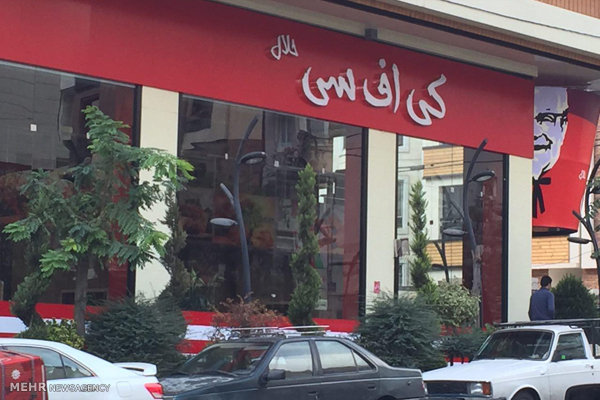
Closing of fake KFC branch in Tehran has provided a barometer of the resistance by the government about possibilities of American food brands finding their way to Iranian market.
The news item is quite simple: on Monday, a branch of KFC has been opened in Tehran’s high-brow neighborhood Shahrak-e-Gharb; however, the next news item comes rather too fast: on Tuesday, the same branch has been closed by the authorities, who have been sensitive to an American food brand possible branch in Tehran. The branch closed finally roughly 33 hours after opening for business.
But the major reaction yet comes from KFC; “we are shocked by the news that an illegitimate KFC outlet has opened in Tehran,” Yum Brands told CNNMoney. “No franchise rights have been granted to any party in Iran,” ending speculations as to the authenticity of the Tehran branch of the famous brand.
The restaurant owner Abbas Pazouki told reporters on Tuesday that it had nothing to do with the American KFC brand; but his Halal KFC expressly uses the an image of Colonel Sanders to indicate the restaurant location on a map of Tehran. He also told reporters that the branch was affiliated with a Turkish Halal KFC which is a rival to American KFC and its products have as target markets of Muslim countries. A description in the website speculated to be belonged to the closed branch writes that the Halal KFC is acting with a license from Turkish similar brand name, confirming the owner’s claims.
Despite the fact that Mr. Pazouki had claimed that he had obtained necessary permits from the authorities, police justified the closure by resorting to claim that the restaurant was using a fake license.
Apart from the simple story and its face value, the issue of infiltration by the US after JCPOA into Iran had been the dominant theme of the speeches in official and nonofficial events of the government; notably, the Leader of the Islamic Republic had emphasized in his letter of JCPOA approval to President Rouhani that imports of US consumer goods should be stopped in line with Resistance Economic policies.
The public as well as Mr. Pazouki would have underestimated the level of sensitivity of the government officials to American brand names and generally everything American; this is part of a common concern voiced over past few weeks that the opening country’s borders to foreign goods, especially American, would pose the threat of being too American in terms of US influence over culture and economy of a country which severed relations almost 36 years ago. Even a fake American brand sparked immediate response by authorities who felt the threat and reacted out of the same concerns.
In the months post-JCPOA, Iran’s economy and the market has attracted European companies who had been banned by the sanctions restricting trade with Iran; now, American companies, including food brand names, see Iranian market as a market with great potentials and young consumers who would welcome famous international brands in food and other industries with improvements on the horizon for country’s hard-hit economy.
The government bodies would be equally divided in the issue of whether US famous brand names could come to Iran; opponents fear that such an act would invite a flood of foreign (mainly European and American) products swarming markets. However, the ultimate current consensus is that the economy should keep doors closed to foreign goods to prevent the damaging effects of unregulated imports and that this is crucial for the Islamic Republic of Iran which emphasizes upon an anti-American agenda and mentality, not to haste to a policy which would potentially bring about westernization of the country.







